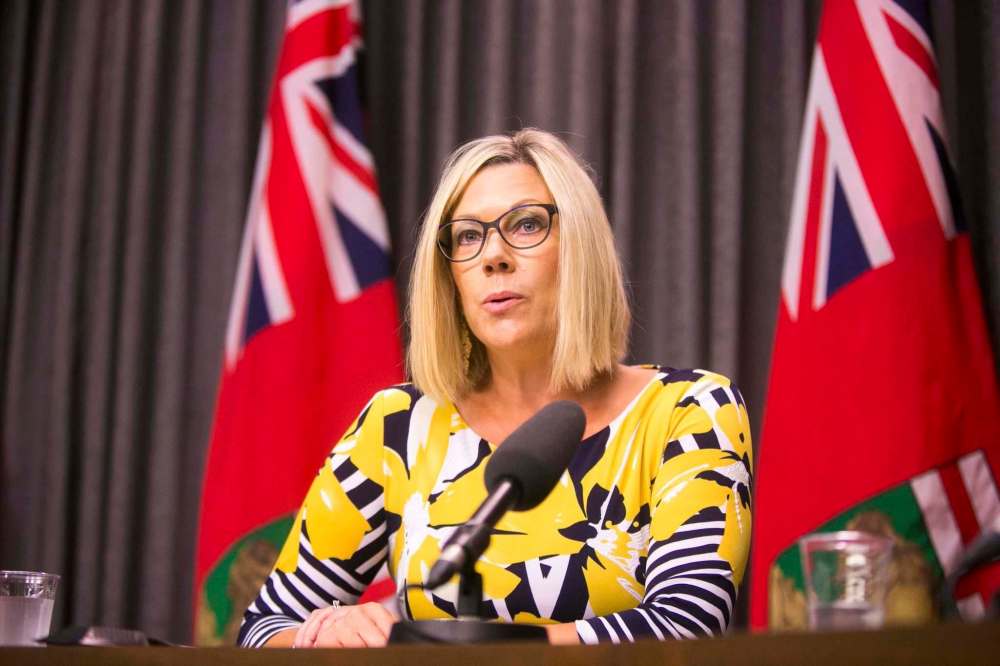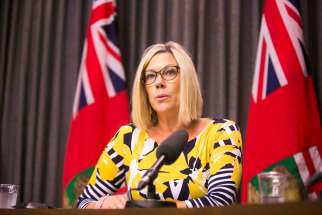Province’s lack of communication unacceptable
Read this article for free:
or
Already have an account? Log in here »
To continue reading, please subscribe:
Monthly Digital Subscription
$0 for the first 4 weeks*
- Enjoy unlimited reading on winnipegfreepress.com
- Read the E-Edition, our digital replica newspaper
- Access News Break, our award-winning app
- Play interactive puzzles
*No charge for 4 weeks then price increases to the regular rate of $19.00 plus GST every four weeks. Offer available to new and qualified returning subscribers only. Cancel any time.
Monthly Digital Subscription
$4.75/week*
- Enjoy unlimited reading on winnipegfreepress.com
- Read the E-Edition, our digital replica newspaper
- Access News Break, our award-winning app
- Play interactive puzzles
*Billed as $19 plus GST every four weeks. Cancel any time.
To continue reading, please subscribe:
Add Free Press access to your Brandon Sun subscription for only an additional
$1 for the first 4 weeks*
*Your next subscription payment will increase by $1.00 and you will be charged $16.99 plus GST for four weeks. After four weeks, your payment will increase to $23.99 plus GST every four weeks.
Read unlimited articles for free today:
or
Already have an account? Log in here »
Hey there, time traveller!
This article was published 22/08/2018 (2666 days ago), so information in it may no longer be current.
Two things are certain in St. Boniface as homeowners enjoy the final weeks of summer with barbecues and dinner parties: first, nobody will serve salad made with produce from their backyard gardens; second, Rochelle Squires won’t be invited.
Ms. Squires, the provincial sustainable development minister, will not be popular in St. Boniface after the Free Press reported the province knew soil in that Winnipeg neighbourhood was contaminated with heavy metals, including lead, but didn’t tell residents for more than six weeks. One sample came back six times greater than the residential standard.
High-level officials in Ms. Squires’ department got the data June 4. The residents were told July 17.
The timeline is important because early summer is when children are playing outdoors and Winnipeg’s many gardeners enjoy the first bounty of their backyards.
Had the province shared the report that revealed high lead levels, gardeners would likely have trashed their potentially poisoned produce rather than serve it to their families.
How could the province sit on such an important report?
On July 17, when news of the lab results was finally made public, Ms. Squires said she first learned seven to 10 days before residents were told.
But when the Free Press challenged her timing this week with an email that listed her at an earlier meeting, she backtracked and now admits she knew about the results June 21.
Ms. Squires partly blames an election news blackout that began with the St. Boniface byelection called on June 19.
But her staff had the report two weeks before the blackout began. And this explanation also doesn’t explain why the province’s extreme-to-a-fault interpretation of the blackout ignored the section that permits publicizing “important matters of public health.”
Ms. Squires and her team bungled the file with faulty communication on three fronts: within her department, with an untruth told to the media and, most importantly, with a delay in telling St. Boniface residents who would surely want to know if they are ingesting lead.
Unfortunately, ineffectual communication has plenty of precedence in the Pallister government. If St. Boniface residents want to complain about poor communication, they’ll have to get in line.

Health-care workers say massive restructuring has been made more difficult by sparse communication from the province to the front lines.
Unions say the government’s approach to public sector workers — automatic antagonism without first discussing possible co-operation — has forced protests, legal challenges and an us-versus-them duality.
In dealings with Ottawa on numerous issues, including a carbon tax, Manitoba has communicated pugnaciously as a first resort, a short-sighted starting point when dealing with a government partner on which Manitoba relies for financial support and co-operation.
Even traditional Conservative allies, such as former Manitoba Hydro chairman Sandy Riley and members the utility’s board, have experienced the premier’s cutting communication, prompting them to resign en masse.
It’s in this context that St. Boniface residents should regard the province’s failure to communicate.
Perhaps, however, this was a teachable mo-ment for the government, and an effort to improve communication could begin in St. Boniface. Residents want to know: what precisely is the source of the contamination? What is the geographical extent of the contamination? How dangerous is it to eat St. Boniface produce and allow children to play outdoors? What are the government’s plans to track and prevent further contamination?
Moving forward, Ms. Squires and her team can make amends by giving the contaminated soil the priority attention it deserves. And, this time, by keeping St. Boniface in the loop.












